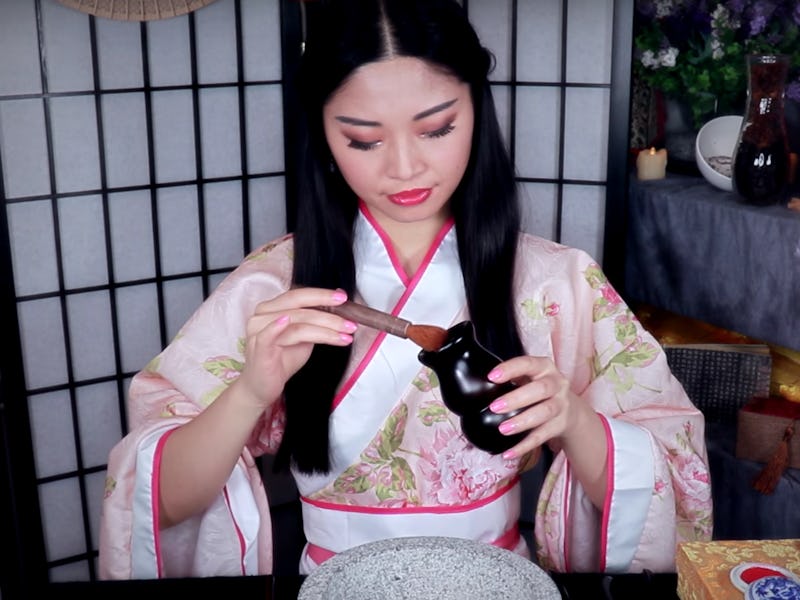China Just Banned ASMR Relaxation Videos for Being 'Vulgar and Pornographic Content'
They're afraid people are getting the wrong kind of tingles.

ASMR, the quirky YouTube subculture, has acclimated to mainstream attention with relatively little backlash — until now. China’s government has leveled their notoriously authoritarian Internet censorship policy at the relaxation genre, labeling it vulgar and pornographic. It’s unclear what method of determination is being used to distinguish sexual ASMR videos from their family-friendly counterparts, but many videos have already been removed from major Chinese streaming platforms.
If you’re not familiar with ASMR, short for ‘autonomous sensory meridian response,’ it’s a rapidly growing (most popular channels hover around 100,000 subscribers) YouTube trend of videos meant to provide calming “tingles” that feel kind of like goosebumps. ASMR creators, or ASMRtists, “trigger” tingles by whispering, tapping different objects, and roleplaying situations like doctor’s office visits and makeovers.
The niche YouTube subculture carries a sexual stigma.
Popular Chinese ASMRtist Tingting explained the association to Inverse in an email. “People will always try to abuse what’s trending no matter the subject and a lot of people think an easy way to get views is to be overly sexual, but I don’t think that means that ASMR is sexual,” Tingting tells Inverse in an email, noting that most of her viewers are female. “ASMR is just continuing to grow in popularity lately and people are trying to abuse the trend. ASMR is just a nice relaxing sensation some people get, there’s nothing sexual about it.”
Tingting thinks it’s pretty normal for China to take a stance like this, since adult content is illegal and a lot of ASMR performed by Chinese women is adult material in disguise. Searching “Chinese ASMR” brings up videos by Tingting — but results also include women in bras and miniskirts, with camera angles pointed below the neck, whose videos focus on kissing and licking. Those are technically both ASMR triggers, but it’s easy to pinpoint which “ASMR” videos are targeted toward adults.
The controversy in the ASMR community over sexual content can be observed just by scrolling through discussions in the /r/ASMR subreddit. Some prominent ASMRtists, like Karuna Satori ASMR, who has nearly 350,000 subscribers, have entire Patreon channels dedicated to producing sexual ASMR. There’s also an /r/nsfwASMR subreddit, and ASMR even has a noticeable presence on pornography streaming sites like PornHub.
In the US, there hasn’t been an overt backlash from YouTube over questionable ASMR content, but some ASMRtists have noticed their videos being demonetized, regardless of whether the supposed sexual content is intended or not. For those unfamiliar with ASMR, a lot of video material can look questionable — for the uninitiated, things like ear kissing and roleplay sound sexual, because, well, what else could that be referring to? It has caused tension in the community from ASMRtists trying to craft a family-friendly brand, not to mention the many children and teenagers who have channels of their own.
China has banned websites ranging from Twitter to Google to SoundCloud, so the idea of restricting freedom is nothing new for citizens. Some ASMRtists have reported that their content is still available on Chinese streaming sites, while ASMR fans have bemoaned the takedown of their favorite sleep aid.
“I think the initial banning of ASMR in search engines is just to give them time to weed out the adult content,” Tingting said. “Girls barely wearing any clothing and using two cameras, one to focus on their chest and the other to focus on their bare legs in a mini skirt. Is that ASMR? Maybe, but it’s also pretty risque and vulgar and in the long run hurts the ASMR community by giving people the wrong idea.”